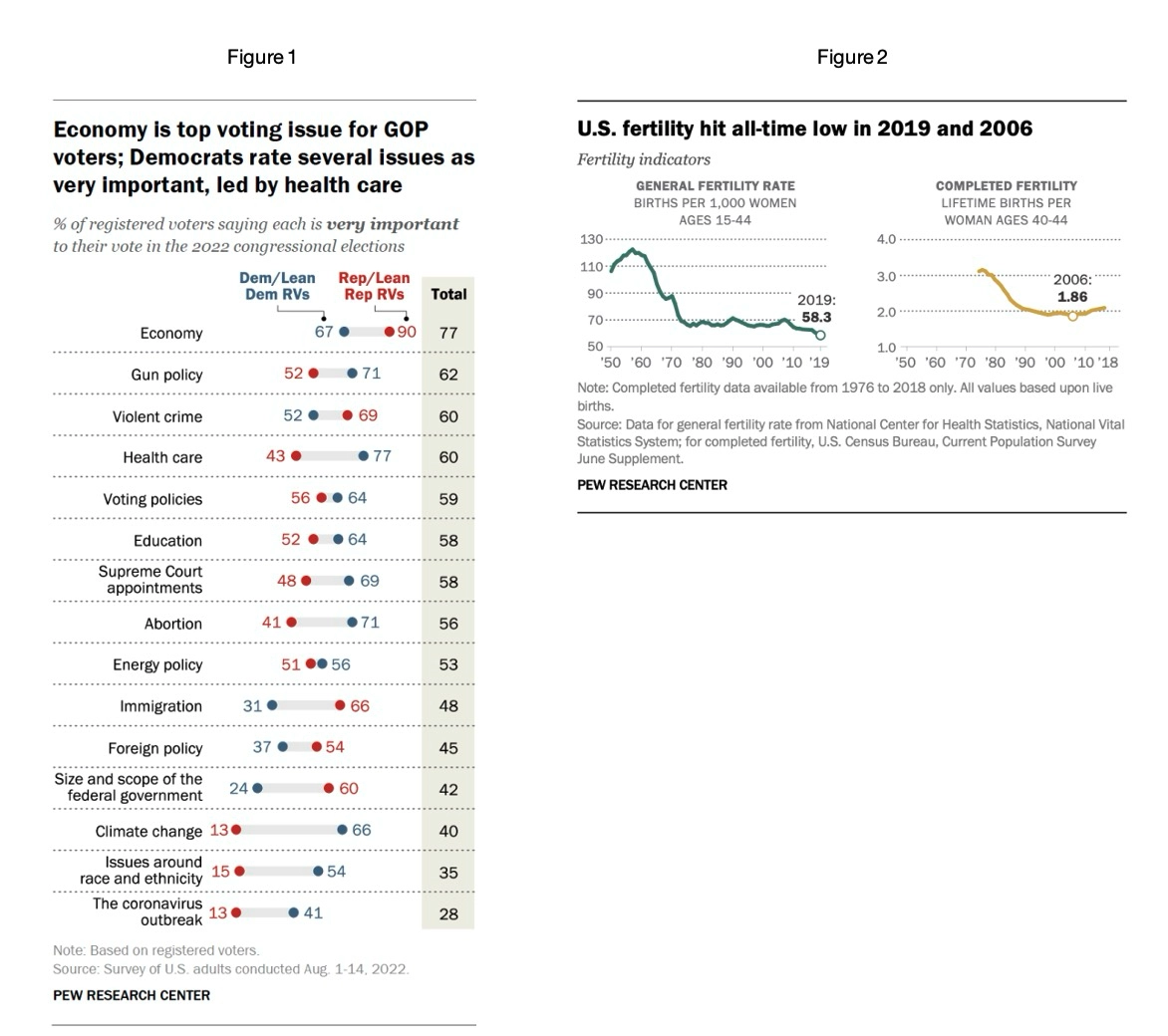The Evolution of Gen Z: Seeking to Change the World | Feb 2023
The economy, gun policy, violent crime, and climate change are a few of the things Gen Z wants to change.

As an ice-breaker exercise on social issues, I asked undergraduate students to consider Pew Data’s recent survey “Percent of registered voters saying [each topic] is very important to their vote in the 2022 congressional elections” (see Figure 1). At a rural regional college in the Midwest, students were surprised by the discrepancies between what an aggregate of Americans considered to be pressing issues and what they, as Gen Zers, considered to be pressing issues. For many, the survey results did not reflect their experience with these social issues. The economy, gun policy, and violent crime were arguably at the top of their own lists, but one issue they ranked as a high priority was low in importance according to Pew: climate change.
As a Sociology professor, I wasn’t shocked by the high importance students place on climate change. While teaching an Introduction to Sociology course in the previous academic year, students were given statistics regarding lower birth rates among Millennials—and even lower predicted birth rates for Gen Z. In a 2020 report distributed by the Centers for Disease Control and Prevention, the expected number of births that a woman would have within her lifetime (total fertility rate, or TFR) decreased to a record low of 1.73 for Millennials and Gen Z. We discussed a variety of reasons for this change, including possible social, structural, and institutional factors (e.g., “mommy tax,” lack of universal healthcare, high cost of daycare). Yet, many students identified climate change as a key factor in their decision about whether to have children. The fear of bringing children into a dying planet appeared to be a common sentiment among the students.
Climate change is indeed an important issue to Gen Z, affecting individual lives and decisions. In a recent study conducted by the Pew Research Center (2021), researchers found that in comparison to other generations, Gen Z are more likely to list climate change as a top concern, more likely to take action, more likely to have done at least one activity to address climate change, and more likely to have recently talked about a need for action on climate (see Pew Report, "Gen Z, Millenials Stand Out for Climate Change Activism, Social Media Engagement With Issue")
Due to instant internet access to global news stories, the rise and media coverage of the #BLM movement and #metoo movement, the COVID-19 pandemic, and growing Gen Z involvement in social advocacy, It is no surprise that Gen Z young adults are more concerned than ever about the macro-level aspects of society that, as recently as 5 to 10 years ago, were difficult to explain to undergraduates, let alone for them to fully comprehend. Such analysis involves understanding social issues that may not appear to directly affect their everyday lives, but rather are indications of institutional and structural failures. Gen Z is not only aware of the social issues at hand, but also more apt to seek systemic and transformative social change (Luttrell & McGrath 2021). In fact, a key characteristic of Gen Z is their “strong sense of inheriting institutional forms that are broken or incapable of solving the enormous problems the world is facing” (Katz, Ogilvie, Shaw, Woodhead 2021:157). In addition to concerns about climate change and the future of the planet, Katz et al. (2021) suggest that post-millennial Gen Zers are worried about issues of racial justice, growing socioeconomic inequalities, global political unrest, and gun control, all issues that Gen Z respondents felt previous generations had left “broken."
This strong sense of advocacy and desire to foster social change is different from early predictions that researchers reported. Early research (Twenge 2017; Lukainoff & Haidt 2015) suggested that Gen Z was growing up more slowly than previous generations, expanding childhood and delaying the transition into adulthood. This slow growth was said to be evidenced by Gen Z risk aversion, with teens being less likely to have a job, more likely to spend time with their parents, less likely to consume alcohol, and less likely to get a driver’s license than previous generations. As a result of delaying indicators of emerging adulthood, Twenge (2017) asserted that teens were seeking both physical and emotional safety within everyday social interactions and involvement with institutions.
For a generation of young adults who were labeled “snowflakes” before they faced COVID-19, mass inflation, and consistent global violence, Gen Z today is so much more than these early speculations suggested. Instead, what we have witnessed is the evolution of a generation seeking to change the world. Their ability to connect personal problems with larger social issues is the definition of engaging with the Sociological imagination. Whether it is Greta Thunberg challenging world leaders on environmental policies, X Gonzales and fellow Parkland activists organizing March for Our Lives demonstrations, the Sunrise Movement conducting a sit-in at the office of Speaker of the House of Representatives to demand political action on climate change, or Amanda Gorman serving as youngest inaugural poet during President Joe Biden’s swearing-in ceremony, Gen Z is seeking to change the world, one voice at a time. It is Gen Z’s ability to connect the “biography” with the “history” and understand that personal “troubles” are intertwined with larger social “issues” that makes them budding sociologists at heart (Mills 2000). And it is only by understanding this deeper connection that they can work to evoke change.
QUESTIONS FOR DISCUSSION
- Review Figure 1. Do you agree with the percent rank order of “very important” issues for Americans voting in the 2022 congressional elections? How might these percentages be different if they were reported for each generation? In comparison to the Pew Data respondents, how would you rank the importance of each of the social issues?
- Consider the decline in fertility rates among young adults in the United States. What do you feel are the most pressing issues associated with the decision to have children?
- Discuss Gen Z trends regarding climate change as a social issue. Do you feel that Gen Z is more apt than previous generations to work toward advocating for policy and social reform to protect the environment? What methods are Gen Z activists most likely to use to advocate for change (e.g., social media, in-person activism, organizing in-person activism), and why
REFERENCES
Barroso, Amanda. 2021. “With a Potential ‘Baby Bust’ on the Horizon, Key Facts About Fertility in the U.S. Before the Pandemic,” Pew Research Center, Washington, DC. May 7. https://www.pewresearch.org/fact-tank/2021/05/07/with-a-potential-baby-bust-on-the-horizon-key-facts-about-fertility-in-the-u-s-before-the-pandemic/
Center for Disease Control. 2020. “QuickStats: Expected Number of Births over a Woman’s Lifetime—National Vital Statistics System, United States, 1940–2018.” Morbidity and Mortality Weekly Report, 69(1). January 10. https://www.cdc.gov/mmwr/volumes/69/wr/mm6901a5.htm?s_cid=mm6901a5_w
Katz, Roberta, Ogilvie, Sarah, Shaw, Jane, and Linda Woodhead. 2021. Gen Z, Explained: The Art of Living in a Digital Age. Chicago, IL: University of Chicago Press.
Lukianoff, Greg, and Jonathan Haidt. 2015. “The Coddling of the American Mind.” The Atlantic Monthly, September. https://www.theatlantic.com/magazine/archive/2015/09/the-coddling-of-the-american-mind/399356/
Luttrell, Regina, and Karen McGrath. 2021. Gen Z: The Superhero Generation. London, UK: Roman & Littlefield.
Mills, C. Wright. 2000. The Sociological Imagination. New York, NY: Oxford University Press.
Pew Research Center. 2022. “Abortion Rises in Importance as a Voting Issue, Driven by Democrats.” Washington, DC. August 23. https://www.pewresearch.org/politics/2022/08/23/abortion-rises-in-importance-as-a-voting-issue-driven-by-democrats/
Twenge, Jean M. 2017. iGen: Why Today’s Super-Connected Kids Are Growing Up Less Rebellious, More Tolerant, Less Happy—and Completely Unprepared for Adulthood. New York, NY: Atria Books
Tyson, Alec, Kennedy, Brain, and Cary Funk. 2021. “Gen Z, Millennials Stand Out for Climate Change Activism, Social Media Engagement with Issue,” Pew Research Center, Washington, DC. May 26. https://www.pewresearch.org/science/2021/05/26/gen-z-millennials-stand-out-for-climate-change-activism-social-media-engagement-with-issue/

FIGURE REFERENCE IMAGE LINKS
Figure 1
https://www.pewresearch.org/politics/2022/08/23/abortion-rises-in-importance-as-a-voting-issue-driven-by-democrats/pp_2022-08-23_midterms_00-02/
Figure 2
https://www.pewresearch.org/fact-tank/2021/05/07/with-a-potential-baby-bust-on-the-horizon-key-facts-about-fertility-in-the-u-s-before-the-pandemic/ft_2021-05-07_fertility_01a/




